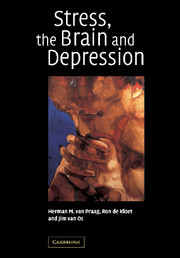Book contents
- Frontmatter
- Contents
- Preface
- 1 Diagnosing depression
- 2 Traumatic life events: general issues
- 3 Life events and depression: preliminary issues
- 4 Life events and depression: is there a causal connection?
- 5 Genetics of depression
- 6 Gene–environment correlation and interaction in depression
- 7 Monoamines and depression
- 8 Stress hormones and depression
- 9 Stress, the brain and depression
- Epilogue
- Name index
- Subject index
9 - Stress, the brain and depression
Published online by Cambridge University Press: 15 October 2009
- Frontmatter
- Contents
- Preface
- 1 Diagnosing depression
- 2 Traumatic life events: general issues
- 3 Life events and depression: preliminary issues
- 4 Life events and depression: is there a causal connection?
- 5 Genetics of depression
- 6 Gene–environment correlation and interaction in depression
- 7 Monoamines and depression
- 8 Stress hormones and depression
- 9 Stress, the brain and depression
- Epilogue
- Name index
- Subject index
Summary
The stress syndrome and depression: psychopathological and biological overlap
Depression is often preceded by life events, i.e. traumatizing occurrences that the stricken individual was unable to process and assimilate adequately, and/or by difficulties and worries that linger on for some time or for a long time and for which no solution seems to come in sight (Chapter 4). Such events and circumstances generate states of psychic distress which vary phenomenologically inter-individually, and over time also intra-individually. Yet certain features are seldom missed. This holds in particular for anxiety and (manifest or suppressed) anger. The psychic manifestations of distress are accompanied by a host of hormonal, autonomic and immunological alterations (Chapter 8). Collectively the behavioural and bodily changes are named the stress response or the stress syndrome.
The trigger of the stress syndrome may be a severe disturbance of corporeal integrity, but more often it is experiential in nature. In that case it is the feeling of frustration or of being endangered, either in a physical or psychological sense that gets the stress reaction underway. Such experiences lead to activation of the corticotrophin releasing hormone (CRH) and noradrenaline (NA) systems (Chapter 8), two systems that are thought to be the driving forces behind the ensuing cascade of stress phenomena.
- Type
- Chapter
- Information
- Stress, the Brain and Depression , pp. 225 - 259Publisher: Cambridge University PressPrint publication year: 2004
- 1
- Cited by



